| Srl | Item |
| 1 |
ID:
111102
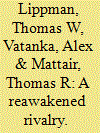

|
|
|
| 2 |
ID:
170050


|
|
|
|
|
| Summary/Abstract |
This article argues that the current crisis of relations between states and citizens in the Arab Middle East cannot just be traced to the rise of postcolonial authoritarian regimes but further back, to the rise of the modern state in the early 19th century. The development of modern citizenship regimes has not empowered citizens, it has instead led to a more passive mode of citizenship. After a historical discussion of the various ruling bargains in modern regional history, the article concludes with a discussion of ongoing protests demanding more active citizenship regimes.
|
|
|
|
|
|
|
|
|
|
|
|
|
|
|
|
| 3 |
ID:
165593
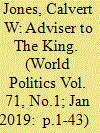

|
|
|
|
|
| Summary/Abstract |
Do experts rationalize and legitimize authoritarian governance? Although research on expert actors in contexts of democracy and international governance is now extensive, scholarly work on their role in authoritarian settings remains limited. This article helps open the black box of authoritarian decision-making by investigating expert advisers in the Arab Gulf monarchies, where ruling elites have enlisted them from top universities and global consulting firms. Qualitative fieldwork combined with three experiments casts doubt on both the rationalization and legitimacy hypotheses and also generates new insights surrounding unintended consequences. On rationalization, the evidence suggests that experts contribute to perverse cycles of overconfidence among authoritarian ruling elites, thereby enabling a belief in state-building shortcuts. On legitimacy, the experiments demonstrate a backfire effect, with experts reducing public support for reform. The author makes theoretical contributions by suggesting important and heretofore unrecognized conflicts and trade-offs across experts’ potential for rationalizing vis-à-vis legitimizing.
|
|
|
|
|
|
|
|
|
|
|
|
|
|
|
|
| 4 |
ID:
132034
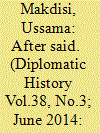

|
|
|
|
|
| Publication |
2014.
|
| Summary/Abstract |
The question of how to represent the U.S. role in the Middle East brings to the fore the question that Edward Said first raised in 1978 in Orientalism about the nature of American understandings of the Middle East. More than three decades after the publication of his book, Said's criticism of Orientalist scholarship-and his accompanying plea for a secular humanistic interpretation to replace it-remain both topical and enigmatic. It is one thing to criticize American representations of foreign cultures; it is an entirely different matter to study American engagements with them. These are by no means unrelated endeavors, but by the same token, they entail very different conceptions of what constitutes a field of inquiry and how to go about studying it comprehensively. The recent emergence of a more critical scholarship of America and the Middle East, therefore, begs the question of whether it is possible to write a history that takes both the Americans and Arabs equally seriously despite the prevailing political climate, and ultimately what kind of methodology this might entail for the rewriting of U.S.-Arab relations, and more broadly, American involvement in the world.
|
|
|
|
|
|
|
|
|
|
|
|
|
|
|
|
| 5 |
ID:
065753


|
|
|
| 6 |
ID:
113292
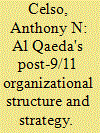

|
|
|
|
|
| Publication |
2012.
|
| Summary/Abstract |
The political transformations under way in the Arab world and the killing of Osama bin Laden raise serious questions about al Qaeda's long-term viability. The secular-liberal Arab Spring protest movement appears to be winning the war of ideas over al Qaeda's violent religious fundamentalism. Civil disobedience campaigns in Tunisia and Egypt succeeded in forcing regime change in ways that a decade of al Qaeda terror attacks failed to accomplish. While it is too soon to write al Qaeda's obituary, its erosion came well before the death of its historic leader. This essay examines al Qaeda's post-9/11 evolution, its strategy, and its steady fragmentation. Since the destruction of its Taliban Afghan sanctuary, al Qaeda has been through many mutations, none of which, over time, has been successful. This essay argues that al Qaeda's failures in Iraq contributed substantially to the organization's decline.
|
|
|
|
|
|
|
|
|
|
|
|
|
|
|
|
| 7 |
ID:
106379
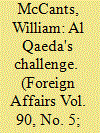

|
|
|
|
|
| Publication |
2011.
|
| Summary/Abstract |
On 9/11, the global jihadist movement burst into the world's consciousness, but a decade later, thanks in part to the Arab Spring and the killing of Osama bin Laden, it is in crisis. With Western-backed dictators falling, al Qaeda might seem closer than ever to its goal of building Islamic states. But the revolutions have empowered the group's chief rivals instead: Islamist parliamentarians, who are willing to use ballots, not bombs.This article appears in the Foreign Affairs eBook, "The U.S. vs. al Qaeda: A History of the War on Terror." Now available for purchase.
|
|
|
|
|
|
|
|
|
|
|
|
|
|
|
|
| 8 |
ID:
111251
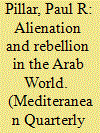

|
|
|
|
|
| Publication |
2011.
|
| Summary/Abstract |
The revolts known collectively as the Arab Spring are largely reactions of alienated populations to the closed economic and political systems that prevail in the Middle East. Revolutions in individual countries have differed because of the differing status of the military, sectarian divisions, and mineral wealth. The prospect of peaceful political change reduces the appeal of extremist ideologies, but extremists still could make inroads to the extent that high popular hopes are dashed. Democracy will need a long time to take root in Arab political cultures.
|
|
|
|
|
|
|
|
|
|
|
|
|
|
|
|
| 9 |
ID:
077363
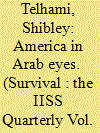

|
|
|
| 10 |
ID:
111716
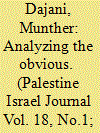

|
|
|
| 11 |
ID:
080080


|
|
|
| 12 |
ID:
146854
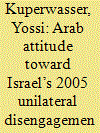

|
|
|
|
|
| Contents |
Brig.-Gen. Yossi Kuperwasser served as the head of the Research Division for Military Intelligence of the Israel Defense Forces in 2005 at the time of the disengagement from Gaza and parts of Northern Samaria. Because of his special vantage point he is able to bring a new insight to the subject. Intelligence professionals were not consulted in the decision-making process. While the Prime Minister and his confidants hoped that this initiative would result in a political advantage for Israel and strengthen its security, it is clear that they did not take possible Arab and Palestinian reactions into account, particularly those of Hamas. In this article Brig.-Gen. Kuperwasser presents the issue of disengagement from a fresh perspective and describes its unintended consequences, which could have been foreseen.
|
|
|
|
|
|
|
|
|
|
|
|
|
|
|
|
| 13 |
ID:
040250


|
|
|
|
|
| Edition |
3rd ed.
|
| Publication |
London, Oxford University Press, 1971.
|
| Description |
viii, 166p.pbk
|
| Standard Number |
0195014758
|
|
|
|
|
|
|
|
|
|
|
|
Copies: C:1/I:0,R:0,Q:0
Circulation
| Accession# | Call# | Current Location | Status | Policy | Location |
| 010034 | 962.053/KER 010034 | Main | On Shelf | General | |
|
|
|
|
| 14 |
ID:
121522
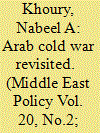

|
|
|
| 15 |
ID:
081338
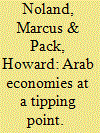

|
|
|
| 16 |
ID:
133819
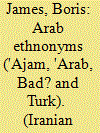

|
|
|
|
|
| Publication |
2014.
|
| Summary/Abstract |
In general terms, the history of the Kurds in the medieval period-or at least those described as being Kurdish in our sources-has attracted relatively little attention within western academia. Moreover, those scholars who have thought to comment on the subject have in general relied on the work of the eminent Russian orientalist Vladimir Minorsky. Hence there has been very little re-examination of the Arabic sources which Minorsky consulted. This article constitutes a first attempt to re-examine some of the "historical orthodoxy" regarding the meaning and nature of the term Kurd in the Middle Ages. More precisely, it aims at questionning the work of those scholars who argue that, due to its ambiguous usage, the term Kurd in the medieval period did not denote an ethnic people. This paper argues that in fact the very ambiguity surrounding the term is indicative of its ethnonymic value and through an examination of the meaning of the term Kurd in this era we can gain a greater understanding of conceptions of ethnic difference in Arabo-Muslim sources.
|
|
|
|
|
|
|
|
|
|
|
|
|
|
|
|
| 17 |
ID:
029511


|
|
|
|
|
| Publication |
New Jersey, Prentice-Hall Inc., 1973.
|
| Description |
x, 269p.pbk
|
| Standard Number |
0130439509
|
|
|
|
|
|
|
|
|
|
|
|
Copies: C:1/I:0,R:0,Q:0
Circulation
| Accession# | Call# | Current Location | Status | Policy | Location |
| 014622 | 956/MAL 014622 | Main | On Shelf | General | |
|
|
|
|
| 18 |
ID:
128611
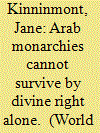

|
|
|
| 19 |
ID:
078723


|
|
|
| 20 |
ID:
109106
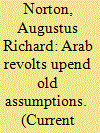

|
|
|